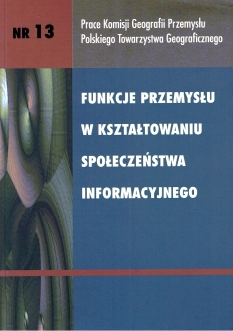Procesy kształtowania się przemysłu komputerowego Brazylii
DOI:
https://doi.org/10.24917/20801653.13.11Słowa kluczowe:
przemysł komputeowyAbstrakt
The article examines development of the Brazilian industrial policy in the IT sector from the creation in 1959 a special agency concerned with computers - the Grupo Executivo para Aplicação de Copmputadores Electrônicos (GEACE) to the liberalization of the informatics policy introduced in 1991 and Computador para Todos program introduced in 2003. The IT policies prevailing in the 1970s and 1980s were oriented toward national production and development of technological capabilities. Since the 1991 protectionism was replaced by liberal policy with incentives and tax rebates as alternative mechanisms preserving some local equipment manufacturing and R&D activities. The general economic success after the introduction in the 1994 Real Plan was also visible in the computer industry. During the years 1994-2006 the employment in this industry has more than tripled and the production of computers increased substantially.Downloads
Metrics
Bibliografia
Adler E., 1986, Ideological „guerrillas” and the quest for technological autonomy: Brazil’s domestic computer industry, International Organization, vol. 40/3, s. 673–705.
Almeida M.C., 2005, The Evolution of the incubator movement in Brazil, International Journal of Technology and Globalisation, vol. 1/2, s. 258–277.
Amann E., Baer W., 2002, The Development of Brazil’s Technological Capabilities in the Post War Period: From Dependence to Self-Reliance, Latin American Business Review, vol. 3/1, s. 1–29.
Anuario Informatica Hoje 2008, 2008, Plano Editoral, São Paulo. http://www.anuarioih.com.br/anuih/ index.html
Dedrick J., Kraemer K.J., Palacios J., Tigre P.B., Botelho A.J.J., 2001, Economic Liberalization and the Computer Industry: Comparing Outcomes in Brazil and Mexico, World Development, vol. 29/7, s. 1199–1214.
Erber F.S., 1985, The Development of the „Electronics Complex” and Government Policies in Brazil, World Development, vol. 13/3, s. 293–309.
Evans P.B., 1986, State, Capital, and the Transformation of Dependence: The Brazilian Computer Case, World Development, vol. 14/7, s.791–808.
Evans P.B., 1989, Declining hegemony and assertive industrialization: U.S. – Brazil conflicts in the computer industry, International Organization, vol. 43/2, s. 207–238.
Etzkowitz H., Carvalho de Mello J.M., Almeida M., 2005, Towards „meta-innovation” in Brazil: The evolution of the incubator and the emergence of a triple helix, Research Policy, vol. 34, s. 411–424.
Langer E.D., 1989, Generations of Scientists and Engineers: Origins of the Computer Industry in Brazil, Latin American Research Review, vol. 24/2, s. 95–111.
Pesquisa Industrial – Empresa, 2001–2006, Instituto Brasileiro de Geografia e Estatística – IBGE, Rio de Janeiro.
http://www.ibge.gov.br/home/estatistica/economia/industria/pia/empresas/
Pesquisa Industrial – Produto, 2001–2006, Instituto Brasileiro de Geografia e Estatística – IBGE, Rio de Janeiro.
http://www.ibge.gov.br/home/estatistica/economia/industria/pia/produtos/
Quandt C., 1997, The Emerging High-technology Cluster of Campinas, Brazil, International Develop-ment Research Center, Technopolis 97, September 9–12, Ottawa
http://www.crdi.ca/cairo/ ev-23090-201-1-DO_TOPIC.html
Science, Technology & Innovation Indicators in the State of Săo Paulo Brazil 2004, 2005, The State of São Paulo Research Foundation – FAPESP, São Paulo (http://www.fapesp.br)
Schoonmaker S., 1995, High-tech development politics: New Strategies and Persistent Structures in Brazilian Informatics, Sociological Quarterly, vol. 36/2, s. 369–395.
Tigre P.B., Botelho A.J.J., 2001, Brazil Meets the Global Challenge: IT Policy in a Postliberalization Environment, Information Society, vol. 17, s. 91–103.
Pobrania
Opublikowane
Jak cytować
Numer
Dział
Licencja
Artykuły publikowane są zgodnie z warunkami licencji Creative Commons (CC BY-ND 4.0; uznanie autorstwa-bez utworów zależnych).

